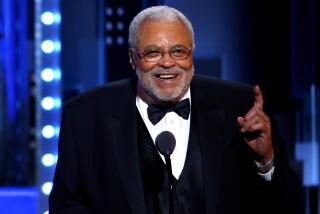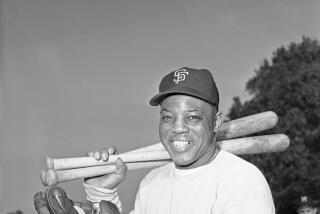James Mays dies at 77; South L.A. cardiologist and community activist
- Share via
Prominent South Los Angeles cardiologist and community activist Dr. James Mays, who helped found several support organizations, wrote more than 20 books and created a masked superhero character to visit schools and give life lessons, died Aug. 21 at Kindred Hospital in Los Angeles. He was 77.
The cause was chronic obstructive pulmonary disease (COPD), said his companion, Eliza Graham.
The illness slowed his pace in recent years, but he kept on working. “He was still going into his office, seeing 25 patients a day, up until three weeks before he died when I drove him to the hospital,” Graham said.
Mays was formerly head of cardiology at Martin Luther King Jr./Drew Medical Center. And at one point he had three area medical clinics where he held occasional free or low-cost health events.
Probably his best known community program was Adopt-A-Family, founded in 1983, to provide financially struggling families with a team of support professionals. The team of successful African Americans — which included Mays, a dentist, a pharmacist, academic tutors, an accountant and a market owner — strove to get the adopted families off welfare and out of poverty.
“This is not a welfare program,” said Mays, a firm believer in free enterprise, at a news conference announcing the program, according to the New York Times. Adopt-A-Family would focus its efforts on children, he said, “in hopes that it will get them started in the right direction so that they may become the future Jesse Jacksons and Ralph Bunches, and not find themselves pointing a gun at somebody in front of a restaurant.”
The first family chosen for the program was that of Essie and James McNeese, who lived in a three-bedroom house in South L.A. with their 10 children.
They impressed Mays when they visited one of his clinics for treatment. “I saw a family with unity that even rich families didn’t have — a family that laughed together and obviously cared for each very much.”
The family, which was featured on “Today” and other national television shows reporting about the program, was able to eventually move to a larger home and several of the children attended college, said Tammie McNeese, a daughter who was a teenager when the family was aided by Adopt-A-Family.
In an interview last week, she said the help the family received was vital. But what she remembered most fondly was the accepting nature of successful people on the team, and especially Mays, who opened his oceanfront home in Palos Verdes to the McNeeses. “We would hang out there with his children in the pool, and it was just like family,” said McNeese, who works as a nurse.
“He invited us in, and it was like going home.”
James Arthur Mays was born May 1, 1938, in Pine Bluff, Ark. The family was poor; in a 1984 Los Angeles Times interview he recalled he “would sometimes go home and there would be nothing to eat.”
He earned his medical degree in 1965 from the University of Arkansas for Medical Sciences in Little Rock.
In addition to his medical work, Mays wrote several novels and other books that he self-published, and he appeared many times on cable access shows and other outlets to bring attention to community events in South Los Angeles.
In 1980, as head of the Los Angeles branch of Jesse Jackson’s national People United to Serve Humanity (PUSH) organization, he invited representatives of the Jewish Defense League to a meeting to “mend our wounds” over comments Jackson had made regarding the Israeli-Palestinian conflict.
“We recognize the historical ties between blacks and Jews, the blood shed by young Jewish men and women in our civil right struggles,” Mays told the Los Angeles Times. “We feel the Jews have demonstrated through the years that the Jews are our brothers.”
Mays also cofounded the Promenade of Prominence at Will Rogers County Park in South L.A. The outdoor walkway honors people who helped the area; the first inductee, in 1988, was then-county Supervisor Kenneth Hahn.
Another Mays project was a comic book starring an African American superhero named Radian who imparted anti-drug and other messages to youngsters about real-world problems. “This is not a little Humpty Dumpty book,” Mays said in a 1982 L.A. Times interview.
He also sent young men dressed in Radian costumes — including masks, capes and boots with large Rs emblazoned on them — to local schools to promote the messages.
Mays’ nephew, Stephen Broughton, followed his uncle to the University of Arkansas and into the medical profession. In a university publication, Alumni Matters, in 2007, Broughton said, “My uncle James taught me that as physicians, we must do more than fulfill the service of medicine called for in the Hippocratic Oath.
“Because we have higher profiles in society, we have a responsibility to be community leaders as well.”
In addition to Graham, Mays is survived by four sons, all of whom are named James. Mays’ two marriages ended in divorce.
Twitter @davidcolker
More to Read
Start your day right
Sign up for Essential California for the L.A. Times biggest news, features and recommendations in your inbox six days a week.
You may occasionally receive promotional content from the Los Angeles Times.







